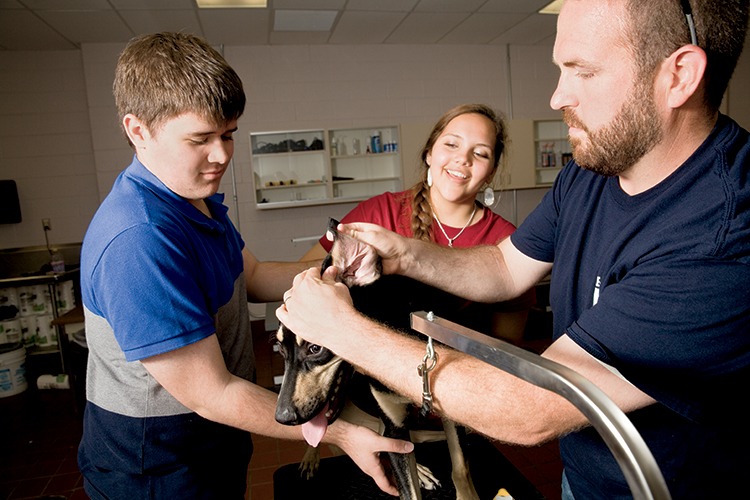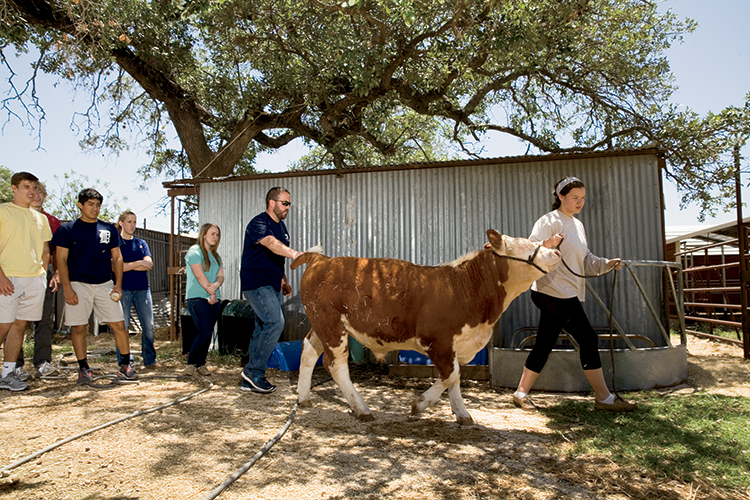Home > Texas > Texas Ag Education > Texas FFA Not Just for Rural Schools
Texas FFA Not Just for Rural Schools
In partnership with: Texas Department of Agriculture

When the National FFA Organization was founded in 1928, its mission was to equip students in rural areas with skills to become leaders in their communities and advocates for agriculture.
Although FFA looks a lot different today than it did 86 years ago — particularly in an increasingly urbanized Texas — the organization’s mission remains the same.
“I think our mission is as relevant today as it was then, and it applies if the student lives in an isolated, rural community as much as it does for the student who is sitting in a school in suburban Houston,” says Texas FFA executive director Tom Maynard.
As the state’s urban and suburban areas continue to grow in population, Texas FFA has adapted with the changes that growth brings.
“Fourteen years ago, Texas FFA had about 56,000 members,” Maynard says. “Right now, we are pushing 104,000. Texas is getting bigger, and people are moving here. We charter 10 to 20 new programs every year, and most of our growth is not in rural areas, it’s in the suburbs.”
School Farm Brings Ag To Urban Students
Offering agriculture education to students in urban schools like Austin’s Bowie High School is a growing trend. Bowie High School is working to give students experiences and opportunities they would not have had otherwise. The school also manages a campus farm.
“A cool part of having a school farm is that most of the kids live in neighborhoods, and most of them don’t have any exposure to animals other than dogs and cats,” says Brandon Henry, one of Bowie High School’s FFA advisors.
Greg Williford, whose son, Graham, is president of Bowie’s FFA chapter, says being around livestock has changed the trajectory of his son’s life. Graham is planning to attend Tarleton State University to major in animal science. That decision is a result of his involvement in raising livestock with FFA.
“It’s given these kids incredible opportunities to raise livestock while living in the city,” Williford says. “I was in FFA 30-something years ago, and it was important to me. I never would have guessed living in the city that my son would have this opportunity. It’s opened a lot of doors and scholarship opportunities.”
Leaders For Life
Mike Geeslin, father of new Bowie High School FFA member Joshua Geeslin, says his son has gained confidence through FFA’s career development events.
“Participating in career development events like the vet tech competition has really expanded his horizons,” Geeslin says. “In the process, he’s also made some close friends.”
Maynard says no matter where an FFA chapter is located, students learn skills that will equip them to be leaders for the rest of their lives. FFA is growing because agriculture is one of the best teaching tools for leadership and responsibility.
“In agriculture, if we fail to do certain things, things die,” Maynard says. “It’s fairly unforgiving, but it’s real. I think a lot of folks have a sense that the leadership development component of FFA is really important in terms of teaching young people to be visionary leaders who can communicate well and build relationships. It teaches them to become people of integrity. I think that has a lot of value.”
Living To Serve
On April 17, 2013, an explosion at a fertilizer plant in West, Texas, destroyed more than 150 buildings, including the town’s high school and its agricultural education facilities. The school is being rebuilt. However, without outside funding, students involved in FFA would not have had a classroom for the hands-on instruction necessary for agricultural education until 2015. Local FFA leaders across the state came together to change that.
“When we understood what the need was and that the school district didn’t have the capacity to respond, we went to our ag teachers and said, ‘Look, we’ve got a couple of our colleagues out here, and they’re in a bad spot,’” says Texas FFA executive director Tom Maynard. “We have more than 1,000 chapters in the state. If every chapter gave us $100, we’d have $100,000.”
Through student fundraising and donations from other groups, more than $200,000 has been raised to rebuild the West FFA chapter’s facilities.
“All FFA members have to learn the FFA motto, and the last line of that motto is ‘living to serve,’” Maynard says. “Those words were reflected in this effort. It was an important life lesson for those students to understand that if everybody pulls together a little bit, the aggregate effort will produce really big results.”




